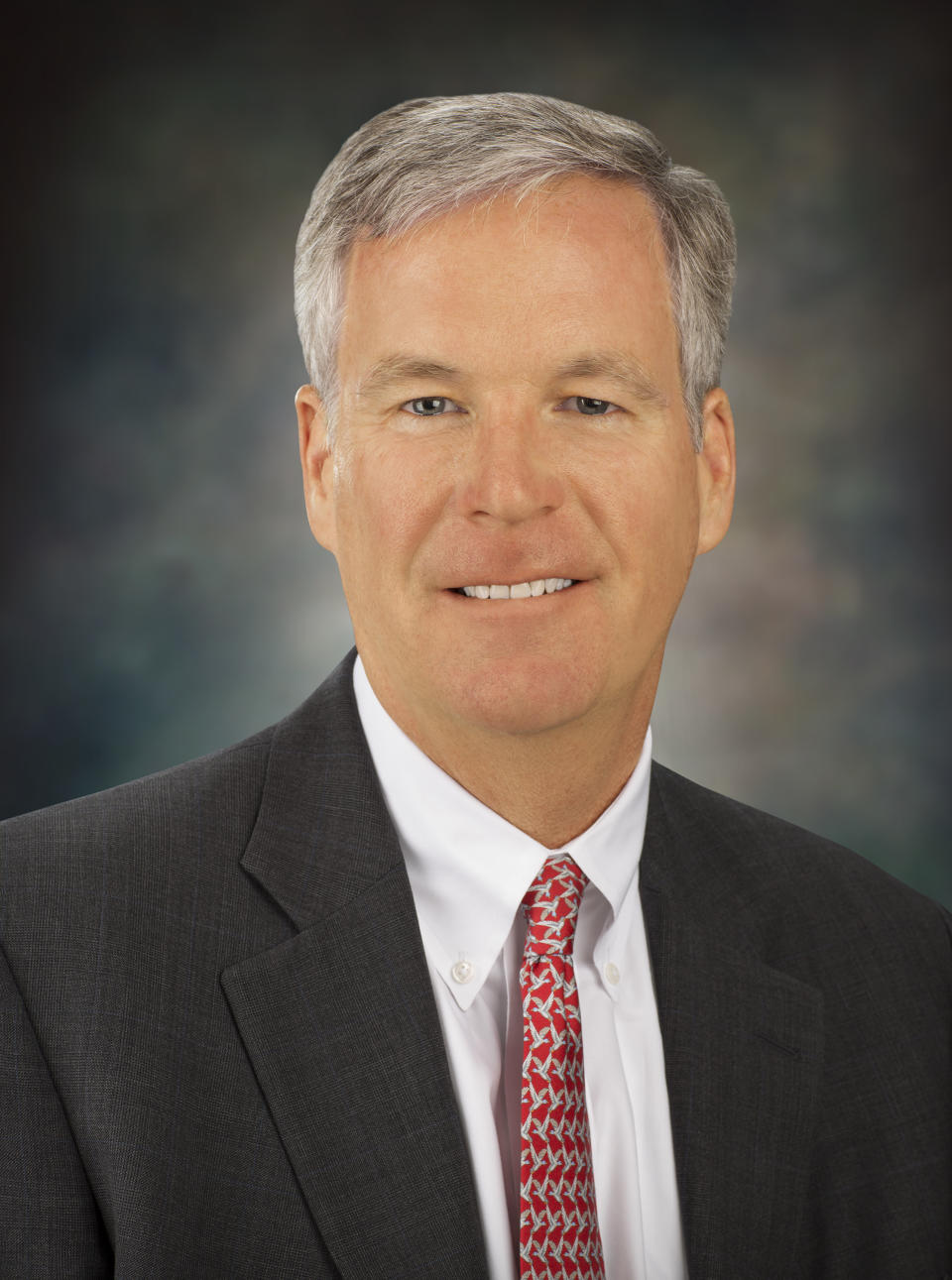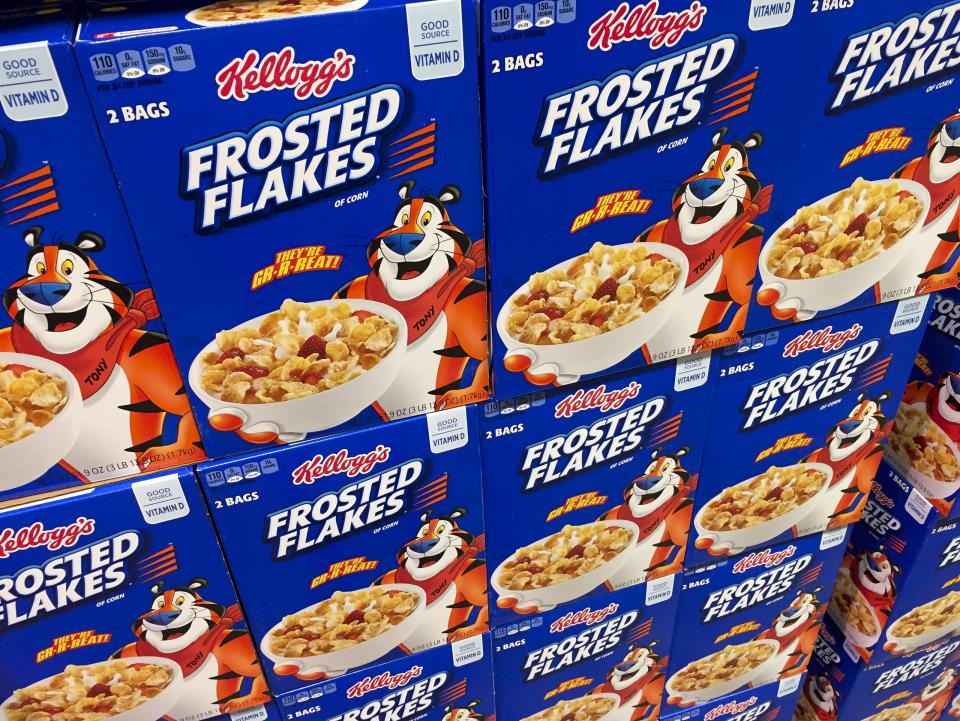Kellogg CEO: 'People are eating more of our cereal'
Kellogg’s (K) is selling a ton of cereal to a nation eating breakfast at home during the coronavirus pandemic. They are also apparently eating Frosted Flakes and Fruit Loops for dinner, too, which means more sales for the cereal giant.
“One thing I mentioned on the earnings call is that one of the highest growth occasions is cereal for dinner. And one of the things driving that is people are making a lot more food at home and they get tired after a while of cleaning up and they say let's have cereal for dinner. The clean up is economical and everybody in the family loves it,” Kellogg’s CEO Steven Cahillane explained to Yahoo Finance in an interview on Thursday.
Kellogg’s reported first quarter sales came in at $3.41 billion compared to forecasts for $3.39 billion. Sales surged across Kellogg’s power food brands such as Frosted Flakes, Eggo Waffles and Cheez-Its. Adjusted earnings of 99 cents a share outpaced projections of 95 cents a share. Kellogg’s reiterated its outlook for full-year organic sales growth of 1% to 2% and for adjusted earnings per share to fall 3% to 4%.
Yahoo Finance spoke with Cahillane at length about the quarter, outlook and the future of his workforce. What follows is an edited and condensed version of the chat.
Brian Sozzi: What is it like managing through a situation such as this pandemic?
Steven Cahillane: This is an unprecedented time. And so the first thing that we did was we established, my leadership team which we call the executive committee here, each and every morning setting aside at least one hour to talk about the situation as it unfolds and what we need to do in the short term, medium term and long term to protect our people, to provide food to the marketplace, and to give back to our communities. So we said those are our three priorities everywhere around the world and nothing is more important than keeping our people safe.
We were very early out of the gates to all sorts of things that have become common practice. We immediately stopped travel. We stopped meetings. We social distanced. We closed offices. We established the safety protocols, beyond what we were already doing in our plants and factories.
And I think that really put us in a great position because our plants have been operating 24/7 at the highest level of productivity ever with an incredibly engaged workforce with incredibly high morale and that came from sharing learnings all around the world and making sure that the the urgency of the moment was tackled at the highest level of the company.
It's a bit of the foxhole mentality. The team's probably closer than they've ever been even though we're seeing each other through a video screen. But everybody's engaged against those three priorities. I'm thinking about when the new normal comes out what that is going to be and how are we going to be a stronger company when that happens.
Sozzi: What does that new normal look like for your company? Do you need to redesign the workplace? Will working from home be extended?

Cahillane: That’s a great question and a really important one that we're spending a lot of time talking about. We've got a very comprehensive plan around how we go back to work and what that looks like. What you've seen — what we've all seen — is you can actually run a company like ours with a remote worker base. It's absolutely stunning that we close a quarter with our whole back office working remotely.
The other thing that we learned though is not everybody wants to stay at home all the time. But I think what you'll find is, because we've proven that it can be done we have the opportunity to be a much more dynamic workforce where there is a balance between time spent working at home or remotely, and time spent working in the office being with colleagues. And so that's going to be important because I think the new normal will be one where social distancing is really important. And so making sure that you have the right density of employees in a workspace is going to be incredibly important. And the fact that people can work from home lends itself to the right variable to make that happen.
So that's the way we're thinking about it, what's the right balance, what's the right cadence and how we do that.
The other thing that we know is we are not going to be asking people or demanding that people return to work. It’s going to be at a very deliberate cadence and based on what people want to do, based on their own comfort levels, based on the new capacity that we have in the office. The other thing I say is now school is not going back and all the different challenges that individuals face in this environment, we are very cognizant of that and so we want to maintain that flexibility and in a way that recognizes that people have other demands on their time and their attention that are really important requirements.
But, I'm very confident that two three years from now, the world's going to be different, and there will be lasting impacts of this. And I hope it's one of the positive things that comes out of an otherwise horrible situation.
Sozzi: Do you think some of these eating occasions such as eating cereal again in the morning sticks around post pandemic?
Cahillane: We know that people are eating more of our cereal. They're not only buying more of it they're eating an awful lot more of it. And we're using consumer research to understand exactly how we can capitalize on that. One thing I mentioned on the earnings call is that one of the highest growth occasions is cereal for dinner. And one of the things driving that is people are making a lot more food at home and they get tired after a while of cleaning up and they say let's have cereal for dinner. The clean up is economical and everybody in the family loves it.
And so a lot of these things are going to stick around. For how long and at what level is dependent on a lot of things, but also dependent on how we take advantage of making sure that we continue to communicate with our consumers in ways that are engaging, innovative and lend themselves to building that brand equity.
Same thing for our snacks business, which was growing very nicely and best served from people snacking more at home. And the one portion of our business where we've seen softness is the on the go occasion. People aren’t putting Rice Krispies Treats in the lunchbox because Johnny's not going off to school. An RX bar usually being consumed at the gym isn't being consumed because that on negotiation is on pause.
How that changes over time we'll have to wait and see as well.

Sozzi: How does this current point in time change your longer term thinking on the company? Do you have fewer SKUs in the market?
Cahillane: I'd say the bias is probably in that direction because what we're finding is in this environment people are gravitating towards brands they love and that they trust, and that's certainly a lot of our portfolio. Some of the more insurgent brands have had a harder time. Now again, that'll be one of those questions. In the next year or so there's probably going to be less SKUs in grocery stores. But the magnitude of that we'll just have to wait and see.
But having the right marketing programs around our big power brands is something we were already focused on. And then we'll continue to focus on that.
Sozzi: What have you seen demand wise in oil-rich markets such as Nigeria? Oil prices have really plunged.
Cahillane: Nigeria is a big market for us. They got into the COVID-19 situation a little bit later. And so we're seeing access for consumers, a lot of the points of sale becoming more challenging. And so we're starting to see some demand issues around how consumers can shop. From an overall macroeconomic standpoint we haven't yet seen the real impact of lower oil prices. But with an oil dependent economy, there's going to be pressure on currency, on the overall state budgets and so we'll just have to stay close to that manager.
We've got a great business there. We got a partner that has been doing business in Nigeria for 40 years, and seeing this play out before he's got a playbook for recessionary environments and we sell a lot of staples there. We'll be able to manage our way through it. The Middle East, Russia, some Latin American countries, Brazil obviously we'll have to stay close to it because it's going to create a lot of recessionary pressure. That will double against what COVID-19 has done.
Sozzi: We are in a severe U.S. economic downturn as well. How has that impacted Kellogg’s?
Cahillane: As I said on the earnings call, we know what happened in the last recession and others before it. I think [with this one] you just don't see a shock like this happen so quickly, whether it be GDP, unemployment, and so forth. And everybody's behavior is changing because of the pandemic and so what's happened for us obviously has been a surge in demand.
I think people's spending habits are going to change fairly dramatically. We're conscious we play an important role as a brand that people rely on and trust. Affordability is really important. Bringing innovation is really, really important because people don't want to hunker down and be miserable they want the brands that they love to bring a little bit of excitement. So we're going to overstate the role we play, but we want to be there for our consumers and we want them to trust our brands and we want them to understand the affordable nature of the meal solution that ready-to eat cereal is. That a MorningStar Farms and Eggo Waffle are.
And so that's how we're thinking about that.
Brian Sozzi is an editor-at-large and co-anchor of The First Trade at Yahoo Finance. Follow Sozzi on Twitter @BrianSozzi and on LinkedIn.
Read the latest financial and business news from Yahoo Finance
Levi's reports solid quarterly earnings, CEO says jeans maker will come out of coronavirus stronger
Yum! Brands CEO on how his 50,000 restaurants are doing amidst the coronavirus pandemic
Grubhub founder: our sign-ups are surging during the coronavirus
HP CEO: here’s how we are helping coronavirus relief efforts
Follow Yahoo Finance on Twitte
